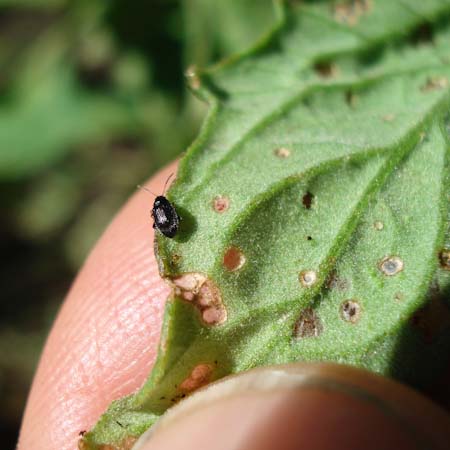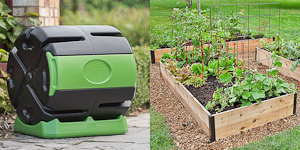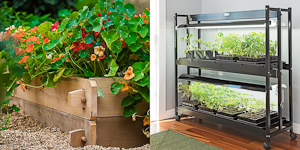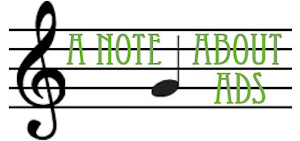- Home
- Garden Pests
Controlling Garden Pests Naturally
Garden pests lurk: you've carefully prepared your soil, planted your garden, and watched your seedlings put on their first few leaves - when you suddenly notice your baby collard plants are starting to resemble green lace. There are little holes everywhere on the leaves, and hundreds of shiny dots crawling around! Oh no, some kind of garden pest! Now what?
(Answer to the riddle: flea beetles, spray them with diluted Alaska fish fertilizer)
 Flea Beetle
Flea BeetleGarden pests come in an overwhelming variety of sizes, shapes, and "MO's" - their own unique ways of eating your plants. Some garden pests chew holes in the leaves, some suck the sap from the stem, some nibble away at the roots or even crawl inside and parasitize the plant.
In chemical warfare, "one size fits all" - you just spray a poison that kills everything and "Voila!", you're done with it - except that:
- What you spray on insect pests to poison them, you have also sprayed on the food you are going to eat. (Would you sprinkle that stuff on your food at the dinner table?)
- Most chemical insecticides kill everything, not just the "bad" bugs, severely disrupting the natural ecosystem
- insects develop resistance to chemical poisons, which will create much worse problems in the future
So what else can you do to control garden pests?
A Bad Infestation of Garden Pests Mean Something's Out of Balance
A bad infestation of garden pests is an indication that things are out of balance in the vegetable garden. You can use an organic, naturally-derived insecticide such as soap spray to kill most of the pests in the short-term without causing any long-term problems, while at the same time working to bring overall health and pest-resistance to the garden ecosystem.
My Favorite Natural Garden Pest Controls
Use of the appropriate natural insecticide for the insect you're dealing with.
These won't work on every bug you may encounter, but they work on many - perhaps most - of them. More detailed descriptions of each of these are found below. My standbys are:
- good ol' soap spray
- The Bug Blaster
- dilute fish emulsion spray
- dormant oil
- neem oil
- diatomaceous earth
Soap spray works pretty well on soft-bodied insects such as aphids, and the fish emulsion works great on flea beetles, which seem to be very partial to my beloved collard greens. (I think the fish emulsion just smells so bad that they get nauseated and lose their appetite!)
The Bug Blaster is a high-velocity hose nozzle that works great against aphids. It's available from the manufacturer at: odonell-innovations.com (Google 'em)
I resort to either dormant oil or neem oil if the other remedies don't work. Dormant oil works by clogging the breathing passages of the insect and suffocating it, and neem oil works in a number of ways. You can buy both dormant and neem oils at garden centers, nurseries, and Home Depot. Neem oil doesn't kill outright, it disrupts metabolism and reproduction, but can be quite effective overall.
Soap Spray
- 1 bulb garlic
- 1 onion
- 1 Tablespoon cayenne powder
- 1 Tablespoon liquid dish soap
- 1 quart water
Whiz everything except the soap up in a blender, pour through a strainer and put in a spray bottle. Add the Tablespoon of soap and mix gently by tipping the bottle back and forth. Spray on affected plants. Watch carefully and spray as needed. Don't use antibacterial soap, and watch for any leaf damage. Some very strong dishsoaps can cause leaf damage. If you notice leaves turning brown the day after you spray, next time you spray, wait half an hour, then hose the soap spay off.
Fish Emulsion
Buy Alaska Fish Fertilizer from Home Depot, mix a tablespoon in a spray bottle of water, and spray on plants. Apply daily for a couple of days, and the flea beetles will go away. I think the fish emulsion just smells so bad they lose their appetites! (Thank you to the Botanical Interests Seed Catalog, where I learned this one. It really works!)
Diatomaceous Earth
Diatomaceous earth is composed of the microscopic glass shells of ancient single-celled organisms called diatoms, which sank to the bottom of ancient seabeds and eventually became a sedimentary rock. This rock is mined and powdered to make diatomaceous earth. These microscopic "broken-glass shards" act on hard-shelled insects (like beetles and ants), by getting into the spaces between their joints and cutting them up, causing the insects to dry up and die. DE is non-toxic to animals and plants, and the "food grade" variety is free of contaminants. It is widely available at home improvement stores and nurseries.
Restoring Balance: Long-Term Plant Pest Control Strategy
This is a little bit like taking Vitamin C and zinc when you're getting a cold: you take stuff to lessen the symptoms, but you also try to build up your immune system through healthful diet, enough sleep, and other good self-care measures.
In the garden, these "immune-building" measures would be:
- Do an annual (or better, semi-annual) soil test and adjust mineral balance for optimal fertility
- Increase the amount of compost and actively aerated compost tea you produce and use on your garden
- Plant a flower "insectary" to attract and house beneficial insects
- Purchase beneficial insects and release them in your garden
- Use companion planting to confuse and deter harmful insects
- practice crop rotation every year
Common Garden Pests
The number of insects that can become problematic in the vegetable garden is overwhelming: aphids, flea beetles, cabbage moth and cutworm, Tomato hornworm, Colorado potato beetle, Mexican bean beetle, thrips, spider mites, whiteflies... where do I start? (Or, where will it end?!)
There are so many different kinds of insect pests that I would need an entire website to show them all, as well as how to control each one naturally. So I researched the web to find a website for my readers to use that has excellent photographs, descriptions and the appropriate natural control measures for each insect, and isn't trying to sell you anything. Couldn't quite find that, but the good folks at Planet Natural up in Bozeman, Montana, where I used to live, have a wonderful page on garden pests. (And even if they are trying to sell stuff, you don't have to buy anything.)
Help share the skills and spread the joy
of organic, nutrient-dense vegetable gardening, and please...
~ Like us on Facebook ~
Thank you... and have fun in your garden!
Affiliate Disclaimer
This website contains affiliate links to a few quality products I can genuinely recommend. I am here to serve you, not to sell you, and I do not write reviews for income or recommend anything I would not use myself. If you make a purchase using an affiliate link here, I may earn a commission but this will not affect your price. My participation in these programs allows me to earn money that helps support this site. If you have comments, questions or concerns about the affiliate or advertising programs, please Contact Me.Contact Us Page



